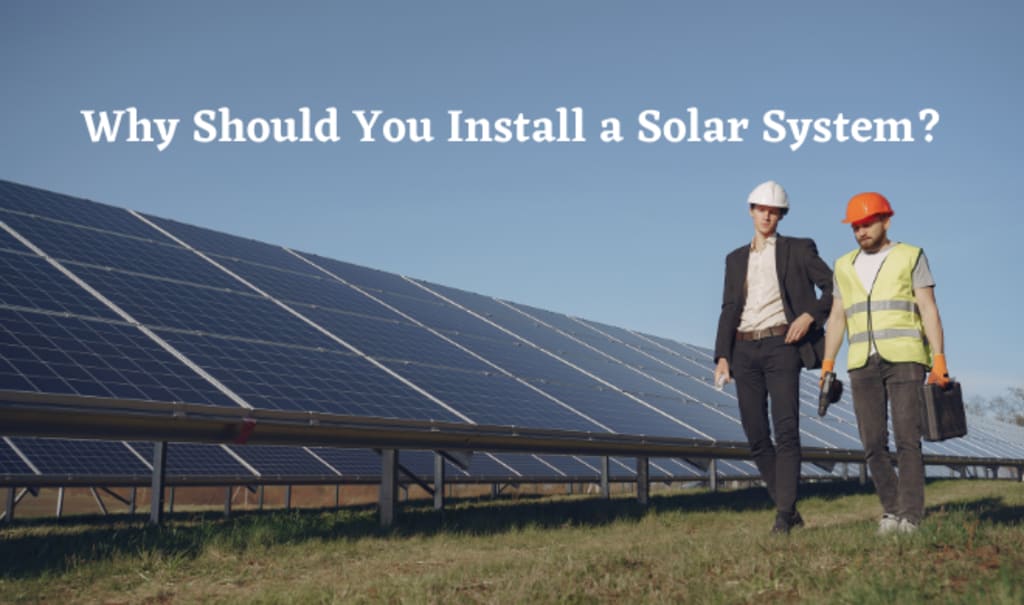Why Should You Install a Solar System?
Solar System Installation

Solar energy has become the trend amongst Australian households, many people still don’t have a clear understanding of the importance and benefits of solar power. As solar companies, it is important for us to show customers the importance of solar panel installation, as we explain the solar energy benefits.
SOLAR IS CLEAR AND SAFE
Solar is a safer alternative to replace fossil fuels like coal and gas. Also, it is a safer alternative for nuclear energy, due that even if nuclear fission generates huge amounts of power, it still generates pollution in the form of nuclear waste and represents a potential risk for environmental disasters as we have seen in the past with Chernobyl or Fukushima. In terms of capacity, the energy produced by solar has doubled from the last decade and will continue to increase as governments around the world are boosting efforts to clean their carbon footprint. The importance of solar power is certain and will play an enormous role in the world’s transition to renewable energy.
SOLAR ENERGY IS A FREE SOURCE OF ENERGY
The sun is an infinite source of clean energy, and nobody can monopolize the sunlight. Your solar energy system will begin saving money the second it’s turned on; nevertheless, you will see the benefits in the mid and long term. Once your solar panel installation is done, you will start generating solar panel savings and you will reduce the amount of pollution created by fossil fuels by reducing the consumption of the energy these non-renewable energy sources produce.
ENERGY INDEPENDENCE
Get a solar panel installation done and you will become less dependent on the energy produced by the grid. As an energy generator, you don’t have to buy as much energy as before, as you will generate your own free energy at zero cost with your solar panel system. And if you have a battery you can keep utilising the energy harnessed by your solar energy system even after the sun goes down.
ENVIRONMENT FRIENDLY
You will contribute to the environment by producing clean energy. Producing energy from power plants implies burning several tons of fossil fuels every year. When your energy comes directly out of your solar system on your roof, you are not producing pollution at all.
LOW MAINTENANCE
Once installed, your solar energy system requires little or no maintenance. They’re typically installed at an angle that permits rain to run off freely, washing most of the dust and dirt away. So long as you keep them from turning into blocked by dust, solar panels might last for over 25 years with little loss in efficiency. However, it is always recommended to do quick maintenance every year by checking the condition of the panels and washing them if required to get maximum solar panel savings.
REDUCED OPERATING COSTS
Probably the most genuine and substantial causes to go solar are the savings on the energy bill. The electricity a solar system produces offsets your electrical utilisation, considerably decreasing (sometimes up to zero) your electricity bill. For extra information on how this works, please read our blog on how to get a $0 bill with solar.
GOOD RETURN ON INVESTMENT
When a business considers any massive financial investment, it must have a significant return and a brief payback interval. A Solar energy system usually has a payback interval of three to 5 years, depending on system size and financing solution utilised. So, after you recover your investment, all financial benefits and savings will go directly to your pocket.





Comments (1)
Solar energy is a renewable source of energy that has gained significant attention in recent years due to its potential to reduce reliance on non-renewable sources of energy, such as fossil fuels. In this chapter, we will provide an overview of solar energy, including how it works, the different types of solar panels and systems, and its advantages and disadvantages. How Solar Energy Works Solar energy is generated by capturing the energy produced by the sun through the use of solar panels. Solar panels are made up of photovoltaic cells that convert the energy from the sun into electricity. When sunlight hits the solar panels, it creates an electric field that generates a flow of electricity. There are two main types of solar panels: photovoltaic (PV) panels and concentrated solar power (CSP) systems. PV panels are the most commonly used solar panels and are made up of layers of silicon cells. CSP systems use mirrors or lenses to focus the sunlight onto a small area, which generates heat that can be used to produce electricity. Different Types of Solar Panels and Systems As mentioned earlier, there are two main types of solar panels: PV panels and CSP systems. PV panels are the most commonly used type of solar panel and are available in two types: monocrystalline and polycrystalline. Monocrystalline solar panels are made from a single crystal of silicon and are more efficient than polycrystalline solar panels. Polycrystalline solar panels, on the other hand, are made from multiple crystals of silicon and are less expensive than monocrystalline solar panels. CSP systems are used to generate electricity in large-scale applications, such as utility-scale solar power plants. These systems use mirrors or lenses to focus sunlight onto a small area, which generates heat that is used to produce steam. The steam is then used to power a turbine that generates electricity. Advantages of Solar Energy Solar energy has several advantages over traditional sources of energy, including: Renewable: Solar energy is a renewable source of energy, which means that it is unlimited and will never run out. Environmentally friendly: Solar energy does not produce any harmful emissions, making it an environmentally friendly source of energy. Cost-effective: Solar energy can be a cost-effective source of energy, especially in areas where the cost of electricity is high. Low maintenance: Solar panels require very little maintenance and can last for up to 25 years or more. Disadvantages of Solar Energy While solar energy has several advantages, it also has some disadvantages, including: High upfront costs: The cost of installing solar panels can be high, although the cost has decreased significantly in recent years. Weather dependent: Solar energy is weather dependent, meaning that it is less effective on cloudy or rainy days. Space requirements: Solar panels require space, and larger solar systems require more space, which may not be practical for some applications. Conclusion In conclusion, solar energy is a renewable source of energy that has several advantages over traditional sources of energy, including its environmentally friendly nature and cost-effectiveness. While there are some disadvantages to solar energy, technological advancements have made solar energy a more practical and reliable source of energy. As the demand for renewable energy sources increases, it is likely that solar energy will play an increasingly important role in meeting our energy needs.